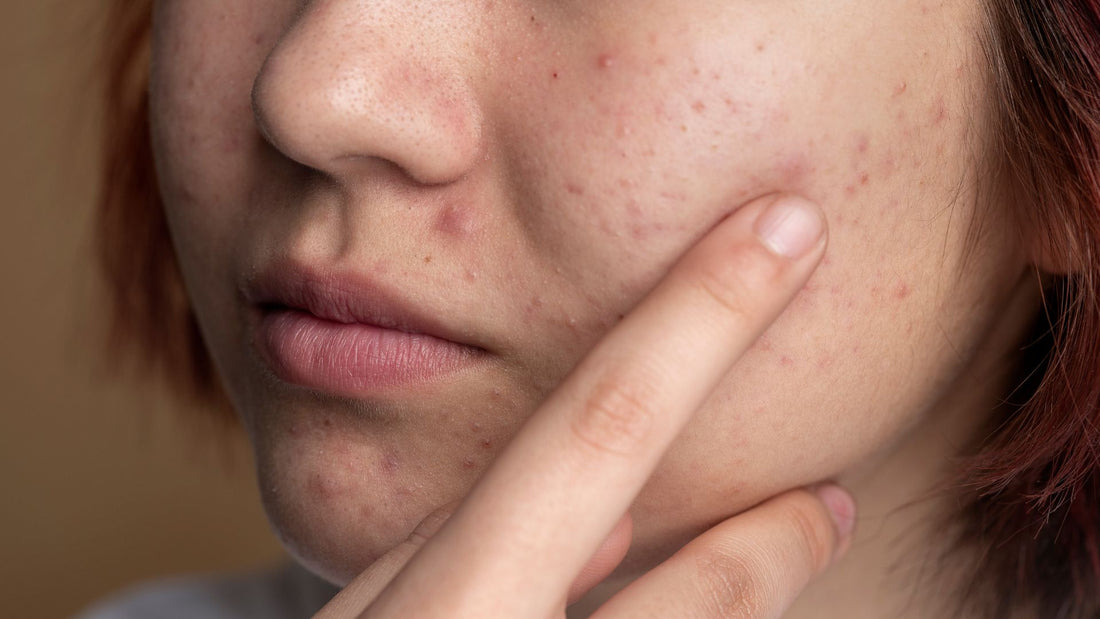Dealing with acne in your 20s and 30s, especially when you thought you left those breakouts behind in your teenage years, can be incredibly frustrating.
But you're not alone. Many adults struggle with oily, acne-prone skin and blemishes. Understanding the causes of adult acne and exploring the different skincare products, including acne serums, can help you effectively manage breakouts and achieve clearer skin.
Understanding the Causes of Adult Acne
Adult acne can be frustrating, but understanding the culprits behind those breakouts is the first step to taking control. Here are some of the key factors that contribute to adult acne:
- Hormonal Fluctuations: Hormonal imbalance is one of the prime contributors, specifically for women. Periods, pregnancy, perimenopause, and menopause can all cause pimples and acne due to shifts in the oestrogen and androgen levels. Androgens stimulate oil production in the pores and skin, creating an environment for clogged pores and breakouts.
- Genetics: If your parents had pimples, you're more likely to have them too. Genes influence how your pores and skin produce oil and react to hormones.
- Stress: Feeling overwhelmed? Stress can worsen pimples. When you are confused, you produce cortisol, a hormone that may increase oil manufacturing and inflammation, both of which contribute to breakouts.
- Undiagnosed Medical Conditions: Certain medical situations, like polycystic ovary syndrome (PCOS), can disrupt hormone levels and lead to acne.
Treating Adult Acne Effectively
One can fight back against breakouts with a variety of effective treatments. This section covers these options, from over-the-counter products to prescription medications and professional treatments, including the use of acne serums in your skincare routine. By understanding these options, you can create a personalized plan to get clearer, healthier skin.
The good news is that adult acne is treatable. Here are some approaches:
- Over-the-Counter (OTC) Products: Look for cleansers with niacinamide or glycerin to combat excess oil and bacteria. Oily, acne-prone skin can benefit from these ingredients in a skincare product.
- Prescription Medications: For more stubborn acne, your dermatologist may prescribe stronger medications, such as oral antibiotics to target inflammation or hormonal birth control to regulate hormone levels.
- Professional Treatments: Depending on the severity of your acne, procedures like chemical peels or light therapy may be recommended. These treatments address deeper issues like scarring or persistent breakouts. Using an acne serum can also help manage and reduce breakouts.
Adult Acne on the Body
Adult acne isn't limited to the face. It can appear on your back, chest, shoulders, and buttocks. The causes are similar to those of facial acne, but treatments may differ.
Preventing Adult Acne Breakouts
While there's no guaranteed cure-all for adult acne, several preventative measures can significantly reduce breakouts and keep your oily, acne-prone skin feeling clear and healthy. Here are some key strategies to integrate into your daily life:
- Gentle Skincare Routine: Wash your face two times each day with a gentle cleanser and lukewarm water. Avoid harsh scrubs and overwashing that may irritate your pores and skin.
- Moisturiser: Don't skip moisturiser! Opt for oil-free, non-comedogenic formulas to keep your skin hydrated without clogging pores. This is especially important for oily, acne-prone skin!
- Healthy Diet: While studies on weight loss programmes and acne are ongoing, a few studies advocate a correlation between high-glycemic foods and dairy and pimple breakouts. Consider prescribing these foods and incorporating extra-end results, veggies, and complete grains into your food regimen.
- Stress Management: Find wholesome ways to manipulate stress, which include exercise, yoga, or meditation. Reducing stress can help enhance your ordinary well-being and potentially reduce breakouts.
Breakout Busters: Expert Tips for Clearer Skin
In addition to the treatment options we've covered, there are extra steps you can take in your daily routine to help prevent breakouts and achieve clearer skin. Here are some expert tips:
- Don't pick or pop acne. This can get worse and cause scarring.
- Change your pillowcase often. This helps prevent the unfolding of microorganisms on your face.
- Avoid touching your face at some point in the day. Your arms can harbour microorganisms that may contribute to breakouts.
Remember, consulting a dermatologist is vital for a customised powerful remedy plan for your adult acne, especially if you struggle with comedonal acne.

